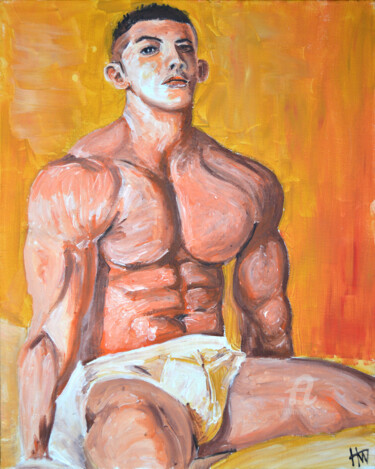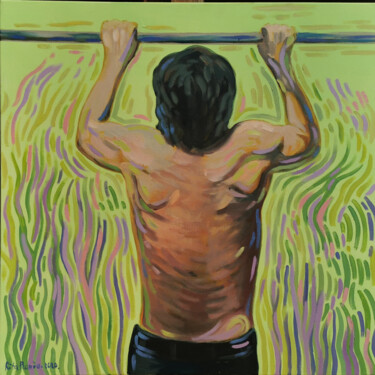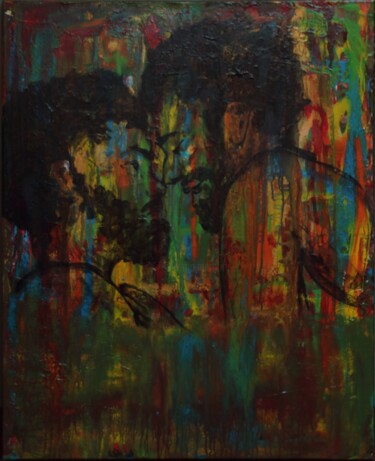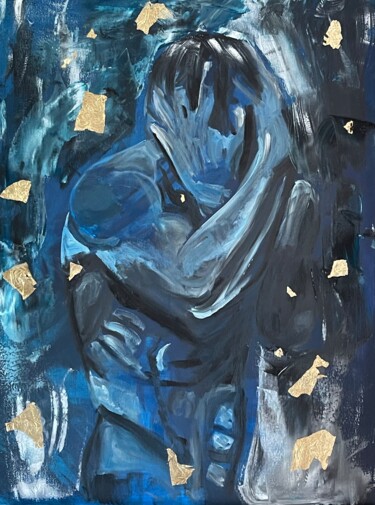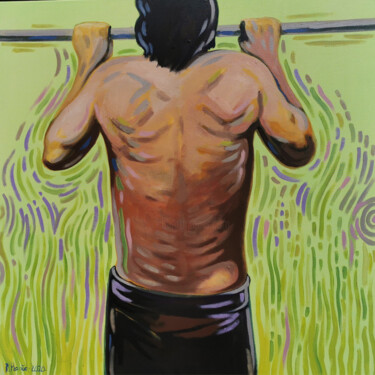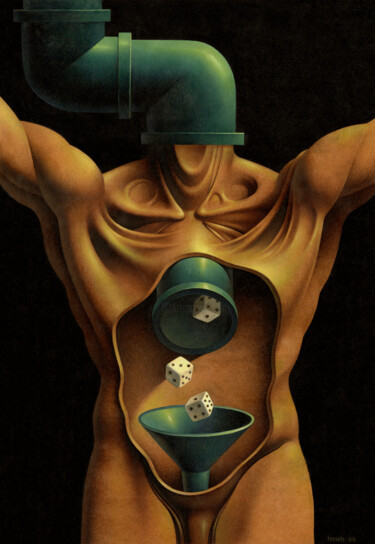
108 Pinturas originais à venda:
Qual é a origem da técnica Acrílico
As tintas acrílicas usam pigmentos tradicionais misturados com resinas sintéticas. O uso da tinta acrílica na Arte desenvolveu-se a partir da segunda metade do século XX, popularizada por artistas como Willem de Kooning, Kenneth Noland ou Mark Rothko que foram os primeiros a usar esse material em suas telas. Composto por pigmentos de origem natural ou artificial à base de resinas e ligantes compostos por polímeros, a tinta acrílica é particularmente apreciada pelos artistas contemporâneos pelas suas características: fácil de diluir, de aplicar, indolor, resistente e durável. Ao contrário da tinta a óleo, a tinta acrílica seca rapidamente e permite muitos efeitos de brilho e textura nas obras de pintura dos artistas. Isso explica por que as tintas acrílicas são provavelmente as mais comumente usadas atualmente.
Compra de obras de arte sobre o tema " nus masculinos "
O nu masculino é um tema de pintura que visa representar a beleza física do homem em seu dispositivo mais simples, como Adão, o primeiro homem da criação. Ao mostrar a sua anatomia, a sua musculatura, os seus pêlos, o nu masculino muitas vezes evoca uma certa imagem de virilidade ou, pelo contrário, uma alegoria da vulnerabilidade do homem que se encontra exposto na sua privacidade. . O nu masculino é frequentemente associado a figuras mitológicas gregas. Os pintores são literalmente apaixonados pelo antigo culto da nudez em suas obras. Algumas das representações mais icônicas de nus masculinos incluem "A criação de Adão" de Michelangelo ou "o Homem Vitruviano" de Leonardo da Vinci.
Você está procurando por Pinturas originais à venda ?
Explore todos os estilos e todas as técnicas de pintura: pinturas contemporâneas, arte de rua, arte abstrata, arte figurativa, paisagens, retratos, naturezas mortas, nus, aquarela, pintura a óleo, pintura acrílica ... Artmajeur é para todos as sensibilidades artísticas e celebra a beleza ao seu lado por 20 anos com mais de 2 milhões de obras de arte contemporânea para descobrir ... ou adquirir! A referência mundial em pinturas contemporâneas. Descubra obras de artistas contemporâneos de todo o mundo para decorar seu interior com classe! Amante da arte simples ou colecionador confirmado? Encontre a tela ou pintura favorita que realmente realce sua decoração. Artmajeur oferece obras originais, edições limitadas e impressões de arte dos melhores artistas contemporâneos do mundo. Na Artmajeur, as pinturas são selecionadas por entusiastas e especialistas do mercado de arte. Selecionamos para você as obras originais de pintores da moda, premiados e reconhecidos, bem como novos valores em ascensão no campo da arte contemporânea para orientá-lo e ajudá-lo em seu processo de compra de pinturas online.
Como comprar uma pintura de arte em acrílico online?
Comprar uma pintura acrílica online pela primeira vez às vezes pode ser uma tarefa difícil, pois há tantos por aí com tantos tons, versões e tipos para escolher. Para a pessoa muito visual, isso muitas vezes pode ser opressor e muitas vezes é difícil saber se você está realmente tomando uma boa decisão de compra. Este artigo o guiará com algumas das principais perguntas que você deve fazer e algumas coisas que você deve considerar antes de fazer a compra.
As compras online tornaram-se a norma para a maioria das pessoas. Todos nós amamos a conveniência de poder comprar qualquer coisa em nosso sofá enquanto tomamos uma xícara de café. Mas e quando você quiser algo específico? E se você realmente quisesse comprar uma pintura acrílica e não soubesse por onde começar? É aí que entramos! Com a nossa loja online, artmajeur.com, pode pesquisar por tamanho ou estilo e encontrar a sua peça perfeita. E com frete grátis disponível em todo o mundo, é mais fácil do que nunca enviar aquele presente especial diretamente para a caixa de correio de alguém!
Você planeja emoldurar a pintura ou pendurá-la na parede simplesmente esticada e montada em madeira? Se você planeja exibir seu trabalho em tela, certifique-se de que o tamanho da peça e a dimensão da moldura sejam adequados.
Que tipo de pintura acrílica você deseja exibir em sua parede?
Você está interessado em um visual mais moderno com cores vibrantes ou um visual mais tradicional com cores mais suaves?
Todas essas são ótimas perguntas e podem ajudá-lo a restringir suas opções, bem como tornar a decisão mais fácil.
Você pode escolher
- tintas acrílicas
- pinturas à óleo
- tintas de água
- e muitos outros tipos de meios e cada um tem suas próprias qualidades e características únicas.
Agora que você sabe que tipo de tela deseja usar, passe para o próximo aspecto da compra de uma peça de arte de parede. A próxima parte é muito importante e envolve garantir que você não seja arrancado quando se trata de uma tela acrílica. As pinturas acrílicas são feitas com uma fórmula específica para que o guache do acrílico seja um meio durável e resistente aos danos. Isso significa que mesmo que a pintura seja danificada, você ainda pode repará-la facilmente.
Pronto para comprar uma pintura acrílica?
Você está no lugar certo em artmajeur.com. Temos uma grande seleção de pinturas acrílicas à venda e estamos prontos para ajudá-lo a encontrar exatamente o que você precisa - seja um abstrato moderno original ou uma impressão de arte. Basta entrar em contato conosco com suas necessidades!
Compre pinturas acrílicas online para adicionar um toque único à decoração da sua casa. Se você quiser economizar algum dinheiro na compra, certifique-se de comprar primeiro, para saber que está obtendo o melhor preço possível. Você precisa verificar as políticas de diferentes sites.
Na Artmajeur, você pode comprar uma pintura acrílica online entre uma grande oferta de milhares de pinturas de artistas de todo o mundo disponíveis em nosso estoque, o que significa que aqui há algo para todos. Quer esteja à procura de arte abstracta, arte da paisagem ou arte da cidade - temos todos eles! Nossos artistas incluem artistas profissionais e emergentes no mercado hoje! Navegue por nossas coleções agora e filtre os resultados para encontrar a pintura perfeita para você ou como um presente hoje!
Comprar uma pintura online pode ser complicado. Você pode não saber como será a aparência da pintura ou se vai gostar.
É por isso que criamos este site para fornecer pinturas de alta qualidade a um preço acessível com frete grátis e devolução fácil. Oferecemos também uma garantia de 100% de satisfação para que não tenha de se preocupar em comprar connosco. Se por algum motivo você não estiver satisfeito com sua compra, basta devolvê-la dentro de 30 dias, e nós reembolsaremos seu dinheiro de volta na íntegra!
Se você está procurando uma bela obra de arte a um preço acessível, confira nossas pinturas em acrílico. Você pode encontrar qualquer tamanho de trabalho ou estilo que deseja atender às suas necessidades. Você descobrirá que oferecemos os melhores preços em pinturas originais online!
Se você deseja comprar uma pintura acrílica online , certifique-se de que o site é confiável. Também é importante saber se sua compra incluirá os custos de envio do pacote especificado no pedido, as taxas alfandegárias devem ser pagas pelo comprador, para que não haja surpresas quando ele chegar à sua porta. Esperamos que este guia o tenha ajudado a tomar uma decisão informada sobre quais pinturas acrílicas são as mais adequadas para você!
Discover contemporary artworks on Artmajeur
Contemporary art is a vibrant constellation of artistic expressions. This creative universe encompasses a wide array of mediums, from paintings, sculpture, and photography to drawing, printmaking, textile art, and digital art, each medium a star shining with its own distinct radiance. Artists use diverse supports and materials to bring their visions to life, such as canvas, wood, metal, and even innovative digital canvases for the creation of virtual masterpieces.
A contemporary painting, for instance, may weave its story through the masterful strokes of acrylic or oil, while a contemporary sculpture might sing its song in the language of stone, bronze, or found objects. The photographic arts capture and manipulate light to produce striking images, while printmaking employs techniques like lithography and screen-printing to produce multiples of a single, impactful image. Textile art plays with fabrics and fibers, whereas digital art pushes the boundaries of creation with innovative technology.
The allure of contemporary art lies in its boundary-pushing nature, its relentless quest for experimentation and its constant reflection of the evolving human experience. This boundless creativity, coupled with its strong social and personal commentary, makes every piece of contemporary art a unique emblem of its time, a mirror held up to the realities and dreams of our complex world. It whispers to us, moves us, provokes thought, and kindles a deep emotional response, stirring the soul of anyone willing to listen. It is, indeed, the language of emotions and ideas, spoken in the dialect of our era.

©2024 Adamcio Art
Origins and history of contemporary art
The story of contemporary art unfolds in the mid-20th century, marked by seismic shifts in artistic expression. Post-World War II, around the 1950s and 1960s, artists began experimenting beyond traditional confines, challenging the norms of what art could be. This revolutionary epoch birthed myriad new movements and artistic forms such as abstract expressionism, pop art, and minimalism. Paintings, once confined by realism, embraced abstraction, as artists used color and form to express emotions and ideas. Notable periods like the advent of pop art in the late 1950s and early 1960s saw artworks mimicking popular culture and mass media, reflecting society’s shifting focus.
The sculptural arts, too, witnessed a metamorphosis. Sculptors started to experiment with new materials and forms, often creating artworks that interacted with the viewer and the surrounding space, fostering a sense of engagement. Drawing, a timeless practice, also evolved, with artists incorporating innovative techniques and concepts to redefine its role in contemporary art.
Photography, a relatively new medium, emerged as a powerful tool in the contemporary art landscape. Born in the 19th century, it truly came into its own in the latter half of the 20th century, blurring the lines between fine art and documentation. Printmaking, a practice dating back to ancient times, saw renewed interest and experimentation with techniques like lithography, etching, and screen printing gaining prominence.
The realm of textile art expanded dramatically, as artists began to appreciate the versatility and tactile quality of fabric and fibers. Artists began using textiles to challenge the boundaries between fine art, craft, and design.
The dawn of digital technology in the late 20th century heralded a new age for contemporary art. Digital art emerged as artists started leveraging new technologies to create immersive, interactive experiences, often blurring the line between the virtual and the physical world.
Through these transformative periods, the essence of contemporary art has remained the same: a dynamic, evolving reflection of the times we live in, continually pushing boundaries and embracing the new, always questioning, always exploring.

©2017 Kateryna Bortsova
Evolutions of theses contemporary works in the art market
As we navigate through the 21st century, the dynamic landscape of contemporary art continues to evolve and expand, reflecting our ever-changing world. Contemporary paintings, once primarily confined to two-dimensional canvases, now embrace a multitude of forms and techniques, ranging from mixed media installations to digital creations, each piece a rich a weaving of thoughts, emotions, and narratives. Sculpture, too, has ventured far beyond traditional stone and bronze, with artists incorporating light, sound, and even motion, embodying the ephemerality and flux of the modern world.
Photography, in the hands of contemporary artists, has expanded its horizons, seamlessly blending with digital technology to create breathtaking imagery that challenges our perception of reality. Drawing, as well, has transcended the borders of paper, incorporating multimedia elements and exploratory techniques to redefine its role in the artistic discourse. Printmaking continues to flourish, with contemporary artists using traditional methods in innovative ways to deliver potent social and personal commentaries.
Textile art, once considered a craft, now holds a prominent place in the contemporary art world, with artists using it to explore issues of identity, tradition, and cultural heritage. Meanwhile, digital art, the newest member of the contemporary art family, has revolutionized the way we create and interact with art, presenting immersive experiences that blur the boundary between the virtual and the physical.
These diverse forms of contemporary art hold significant value in the current art market, not only due to their aesthetic appeal but also their ability to encapsulate and communicate complex ideas and emotions. Collectors, curators, and art lovers worldwide seek these works, drawn to their inherent dynamism, their innovative use of materials, and their eloquent expressions of our shared human experience. As a testimonial to our times, these contemporary artworks encapsulate the pulse of our society and the resonance of individual voices, forever etching our collective narrative into the annals of art history.

©2022 Kateryna Bortsova
Famous Contemporary Artists
As we delve into the vibrant realm of contemporary art, we encounter an array of artists who shape this dynamic field. Each a master in their medium - painting, sculpture, photography, drawing, printmaking, textile, or digital art - they push artistic boundaries, reflecting our era and challenging perceptions. Let’s explore these remarkable contributors and their groundbreaking works.
1. Gerhard Richter - Known for his multi-faceted approach to painting, Richter challenges the boundaries of the medium, masterfully oscillating between abstract and photorealistic styles. His works, whether featuring squeegee-pulled pigments or blurred photographic images, engage in a fascinating dialogue with perception.
2. Jeff Koons - A significant figure in contemporary sculpture, Koons crafts monumental pieces that explore themes of consumerism, taste, and popular culture. His iconic balloon animals, constructed in mirror-polished stainless steel, captivate with their playful yet profound commentary.
3. Cindy Sherman - An acclaimed photographer, Sherman uses her lens to explore identity and societal roles, particularly of women. Renowned for her conceptual self-portraits, she assumes myriad characters, pushing the boundaries of photography as a medium of artistic expression.
4. David Hockney - Hockney, with his prolific output spanning six decades, is a pivotal figure in contemporary drawing. His bold use of color and playful exploration of perspective convey an intoxicating sense of joy and an unabashed celebration of life.
5. Kiki Smith - An innovative printmaker, Smith’s work explores the human condition, particularly the female body and its social and cultural connotations. Her etchings and lithographs speak to universal experiences of life, death, and transformation.
6. El Anatsui - A master of textile art, Anatsui creates stunning tapestry-like installations from discarded bottle caps and aluminum scraps. These shimmering, flexible sculptures blend traditional African aesthetic with contemporary art sensibilities, speaking to themes of consumption, waste, and the interconnectedness of our world.
7. Rafael Lozano-Hemmer - A leading figure in digital art, Lozano-Hemmer utilizes technology to create interactive installations that blend architecture and performance art. His work, often participatory in nature, explores themes of surveillance, privacy, and the relationship between people and their environments.

©2023 Chammika Jayawardana Artista representado por Aartzy
Notable contemporary artworks
The contemporary art landscape is a dynamic patchwork of diverse expressions and groundbreaking ideas, each artwork a unique dialog with its audience. Here are a selection of some renowned contemporary artworks, spanning various media such as painting, sculpture, photography, drawing, printmaking, textile art, and digital art, that have profoundly influenced this vibrant movement.
"Cloud Gate" by Anish Kapoor, 2006 - This monumental stainless steel sculpture, also known as "The Bean," mirrors and distorts the Chicago skyline and onlookers in its seamless, liquid-like surface, creating an interactive experience that blurs the line between the artwork and the viewer.
"Marilyn Diptych" by Andy Warhol, 1962 - An iconic piece of pop art, this silkscreen painting features fifty images of Marilyn Monroe. Half brightly colored, half in black and white, it reflects the dichotomy of celebrity life and its influence on popular culture.
"Rhein II" by Andreas Gursky, 1999 - This photographic artwork, a digitally-altered image of the Rhine River, is celebrated for its minimalist aesthetic. It strips the landscape to its bare essentials, invoking a sense of tranquility and vastness.
"Black Square" by Kazimir Malevich, 1915 - A revolutionary painting in the realm of abstract art, this piece, featuring nothing more than a black square on a white field, challenges traditional notions of representation, symbolizing a new era in artistic expression.
"Puppy" by Jeff Koons, 1992 - This giant sculpture, a West Highland Terrier blanketed in flowering plants, explores themes of innocence, consumer culture, and the interplay between high art and kitsch. It’s a delightful blend of traditional sculpture and garden craft.
"Re-projection: Hoerengracht" by Ed and Nancy Kienholz, 1983-1988 - A room-sized tableau representing Amsterdam’s red-light district, this work combines elements of sculpture, painting, lighting, and found objects. It engages viewers in a stark commentary on commodification and objectification.
"Untitled" (Your body is a battleground) by Barbara Kruger, 1989 - This photomontage, combining black-and-white photography with impactful text, explores issues of feminism, identity, and power. Its potent, confrontational message is a prime example of the power of text in contemporary visual art.
"For the Love of God" by Damien Hirst, 2007 - This sculpture, a platinum cast of a human skull encrusted with 8,601 diamonds, probes themes of mortality, value, and the human fascination with luxury and decadence. It’s a compelling blend of macabre and magnificence.
"Physical impossibility of Death in the Mind of Someone Living" by Damien Hirst, 1991 - This artwork, featuring a tiger shark preserved in formaldehyde, blurs the line between traditional sculpture and biological specimen. It prompts viewers to contemplate mortality and nature’s ferocity.
"One and Three Chairs" by Joseph Kosuth, 1965 - A piece of conceptual art, it presents a physical chair, a photograph of a chair, and a dictionary definition of a chair, thus exploring the relationship between language, picture, and referent in art.
These pieces, in their diversity, exemplify the rich tapestry of contemporary art, each piece a unique commentary on our world and a testament to the limitless potential of creative expression.


Chammika Jayawardana
Acrílico em Papel | 22x15 in

Gerard Menvussa
Acrílico em Tela | 15,8x19,7 in
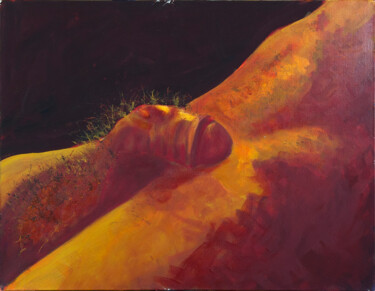
Marcelle Delacité
Acrílico em Tela de linho | 18,1x21,7 in
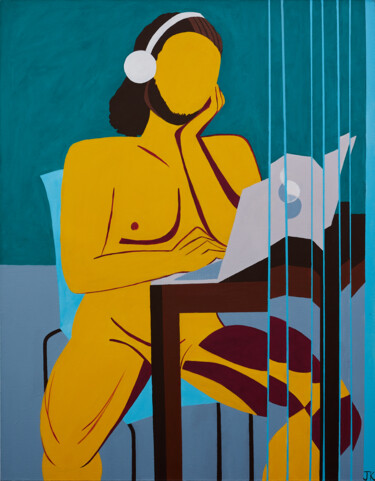
Yuliya Kachur
Acrílico em Tela | 35,4x31,5 in

Oscar Latargez (OSKART)
Acrílico em Papel | 16,5x11,7 in
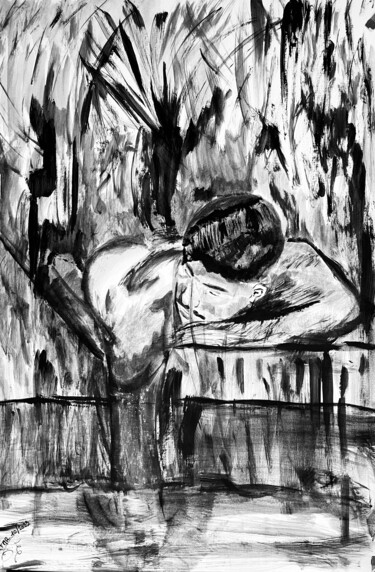
Gerard Menvussa
Acrílico em Papel | 31,5x23,6 in

Chammika Jayawardana
Acrílico em Papel | 22x15 in

Gerard Menvussa
Acrílico em Tela | 19,7x15,8 in

Gheorghita Ouatu
Acrílico em Tela | 31,5x23,6 in
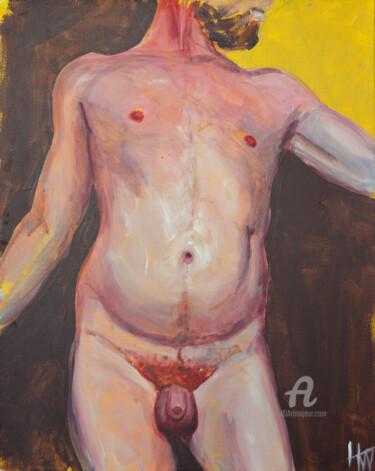
Hank Wandle
Acrílico em Tela | 20x16 in

Kateryna Bortsova
Acrílico em Papel | 23,6x15,8 in

Kateryna Bortsova
Acrílico em Papel | 23,6x33,1 in
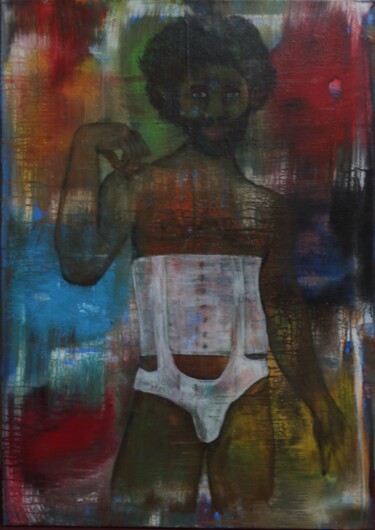
M.E.X. Rietzler
Acrílico em Tela | 39,4x27,6 in
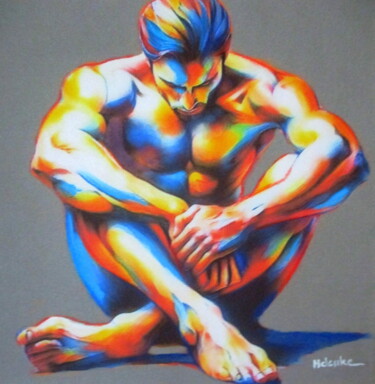
Helena Wierzbicki
Acrílico em Tela | 18,9x18,1 in

Gerard Menvussa
Acrílico em Tela | 31,5x23,6 in
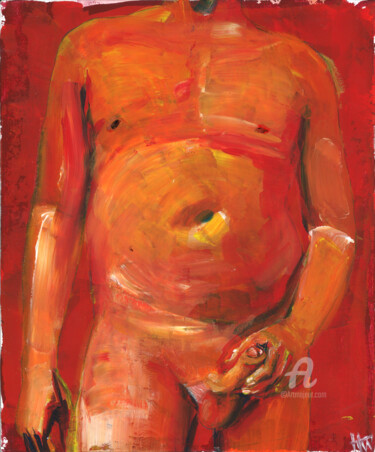
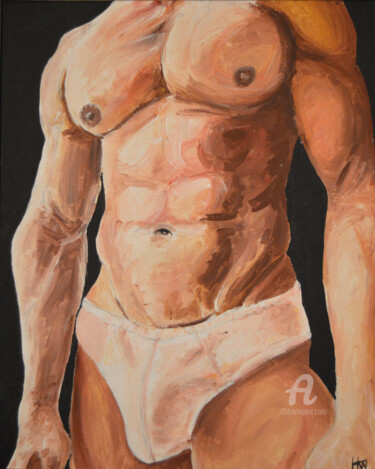

Chammika Jayawardana
Acrílico em Papel | 22x15 in

Kateryna Bortsova
Acrílico em Tela | 39,4x27,6 in

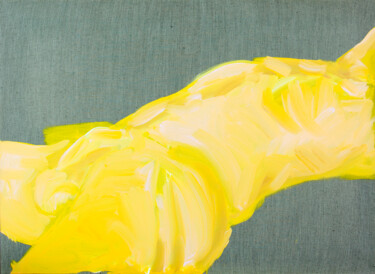
Marcelle Delacité
Acrílico em Tela de linho | 28,7x39,4 in
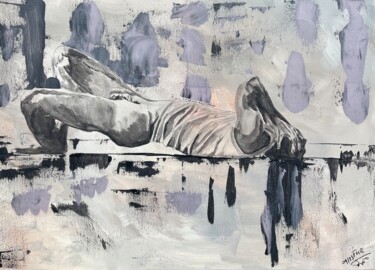
Gerard Menvussa
Acrílico em Tela | 19,7x27,6 in
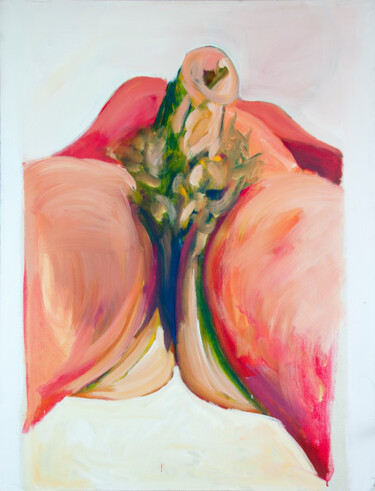
Marcelle Delacité
Acrílico em Tela de linho | 45,3x35 in
